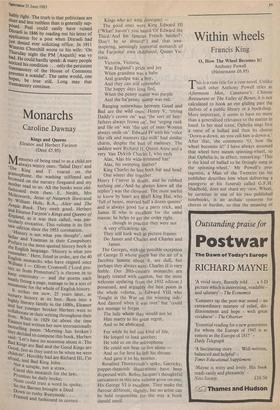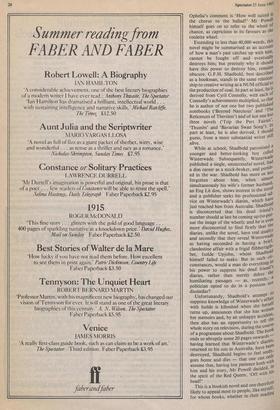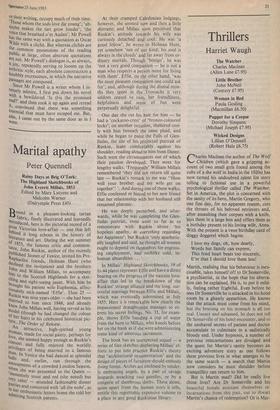Within wheels
Francis King
0, How The Wheel Becomes It!
Anthony Powell (Heinemann £6.95)
This is a rum title for a rum novel. Unlike such other Anthony Powell titles as Afternoon Men, Casanova's Chinese Restaurant or The Valley of Bones, it is not calculated to hook an eye gliding past the shelves of a public library or a bookshop. More important, it seems to have no more than a generalised relevance to the matter in hand. In her mad scene, Ophelia sings first a verse of a ballad and then its chorus 'Down-a-down, an you call him a-down-a.' After that, she comments '0, how the wheel becomes it!' I have always assumed that wheel here means spinning-wheel, so that Ophelia is, in effect, remarking: 'This is the kind of ballad to be fittingly sung at the spinning-wheel.' Mr Powell's pro- tagonist, a Man of the Twenties (as his publisher describes him when delivering a panegyric at his funeral) called G.F.H. Shadbold, does not share my view. Wheel, he surmises in one of his two published notebooks, is an archaic synonym for chorus or burden, so that the meaning of
Ophelia's comment is 'How well suited is the chorus to the ballad!' Mr Powell himself goes on to refer to the wheel of chance, as capricious in its favours as the roulette wheel.
Extending to less than 40,000 words, this novel might be summarised as an account of how a man's past catches up with him. cannot be fought off and eventually destroys him; but precisely why it should have this power to destroy him, remains obscure. G.F.H. Shadbold, best described as a bookman, stands in the same relation- ship to creative writing as a NUM official to the production of coal. In part at least, he is derived from Cyril Connolly, with each of Connolly's achievements multiplied, so that he is author of not one but two published notebooks (`Beyond Narcissus' and 'The Reticences of Thersites') and of not one but three novels (`Trip the Pert Fairies', `Thumbs' and 'Bavarian Swan Song'). In part at least, he is also derived, I should guess, from a more substantial writer still alive. While at school, Shadbold patronised a younger and better-looking boy called Winterwade. Subsequently, Winterwade published a single, unsuccessful novel, had a dim career as a stock-broker, and perish- ed in the war. Shadbold has more or less forgotten about him, when almost simultaneously his wife's former husband, an Eng Lit don, shows interest in the novel and a publisher seeks his professional ad- vice on Winterwade's diaries, which have just reached him from Australia. Shadbold is disconcerted that his dead friend's number should at last be coming up (to Pur- sue the image of the wheel); and he is even more disconcerted to find firstly that the diaries, unlike the novel, have real qualitY and secondly that they reveal Winterwade as having succeeded in having a brief, clandestine affair with a frigid flibbertigih' bet, Isolde Upjohn, whom Shadbold himself failed to make. But in such cir- cumstances, would a man do everything in his power to suppress his dead friend's diaries, rather than merely delete the humiliating passages — as, recently, 3 politician opted to do in a position not dissimilar?
Unfortunately, Shadbold's atternPt suppress knowledge of Winterwade's affair,. with Isolde is kiboshed when she herself turns up, announces that she has written her memoirs and, by an unhappy accident, then also has an opportunity to tell the whole story on television, during the course of a programme about Shadbold. The book ends so abruptly some 20 pages onwards --- having learned that Winterwade's diaries, n returned to his son in Australia, have bee destroyed, Shadbold begins to feel seedY, goes home and dies — that one can only assume that, having lost patience both with him and his story, Mr Powell decided, 1.11 the spirit of the Red Queen, 'Off with his head!' This is a bookish novel and one therefor! likely to appeal most to people, like myself, for whom books, whether in their reading
or their writing, occupy much of their time. Those whom the sods love die young'; 'ab- sinthe makes the tart grow fonder'; 'the voice that breathed o'er Auden': Mr Powell has the same way with a quotation as Oscar Wilde with a cliche. But whereas clichés are the common possessions of the reading public at large, often abstruse quotations are not. Mr Powell's dialogue is, as always, a Joy, repeatedly serving to loosen up the arthritic style, each absolute construction a knobbly excrescence, in which the narrative Passages are composed.
Since Mr Powell is a writer whom I in- tensely admire, I first put down his novel with a bewildered 'Is this the promised end?' and then took it up again and reread It, convinced that there was something essential that must have escaped me. But, alas, I came out by the same door as in I
Went.




















































 Previous page
Previous page